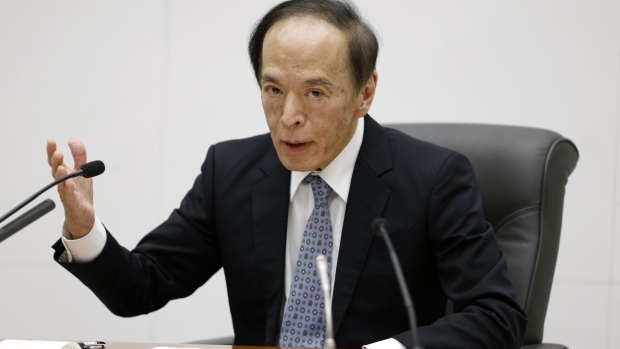Nov 9, 2023
BOJ’s Ueda Says Undershooting Inflation Is Harder to Repair
, Bloomberg News

(Bloomberg) -- Bank of Japan Governor Kazuo Ueda signaled he won’t rush to normalize monetary policy, pointing out that coping with lower-than-desired inflation would be harder than dealing with overshooting given the current situation in Japan.
“In the case of overshooting, I think we will be able to deal with it by raising interest rates,” Ueda said during an online interview at an FT conference Thursday. “In the case of undershooting, it will be rather difficult to deal with it, given the effective zero lower bound on interest rates and other constraints or problems with non traditional monetary policy measures.”
Ueda was speaking amid rising market perceptions that the bank is inching toward normalizing its massive easing program by the middle of next year. Ueda reiterated his view that Japan is making progress toward the BOJ’s 2% inflation target, but it’s not there yet.
When the time comes for an exit, Ueda said raising interest rates will pose a “serious challenge” to the bank. The bank must consider the impact on private banks, borrowers and aggregate demand. Controlling long-term yields will be another big challenge. He said he hopes the bank can exit without creating huge volatility in the bond market, “but we will see.”
The BOJ decided to loosen a grip on its yield control mechanism last week by characterizing the 1% upper limit for 10-year yields as a reference, not a rigid cap. Many economists saw the move as a step toward normalization in a manner that avoids causing a surge of volatility in the market.
Read: BOJ’s Ueda Gets Reality Check on Yen in March to Normalization
He said ending the negative interest rate also poses challenges.
“We will have to proceed fairly carefully because everybody is used to the environment of low interest rates,” Ueda said.
The yen stayed around 151 per dollar after Ueda spoke, a level even weaker than where it traded a year ago when the government intervened to support the currency. The governor said he wants exchange rates to reflect economic fundamentals.
“We, of course, analyze carefully what kind of effects exchange rate changes would create for our inflation and output” in the economy, Ueda said. “And if necessary, we would respond to that.”
©2023 Bloomberg L.P.






